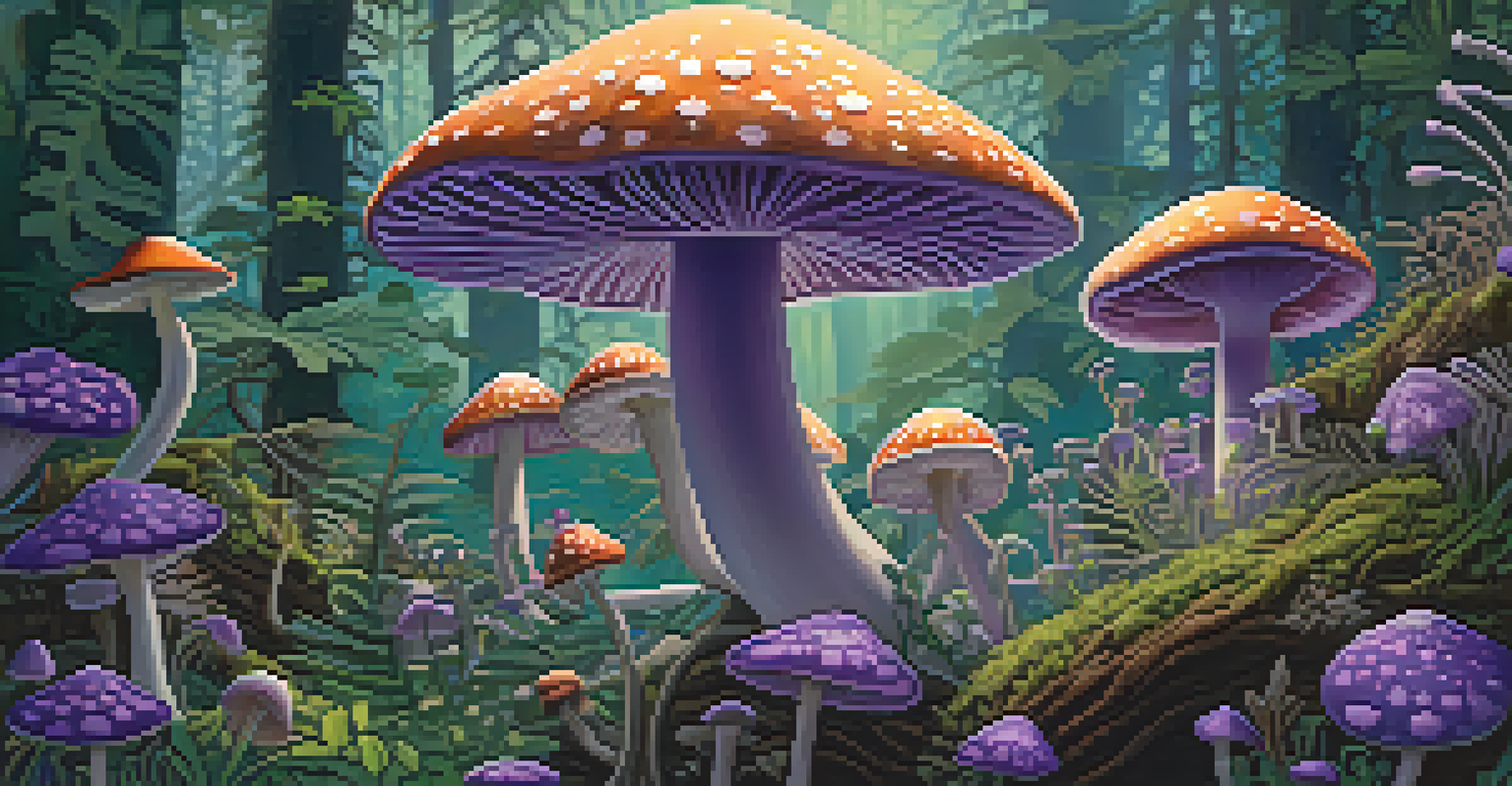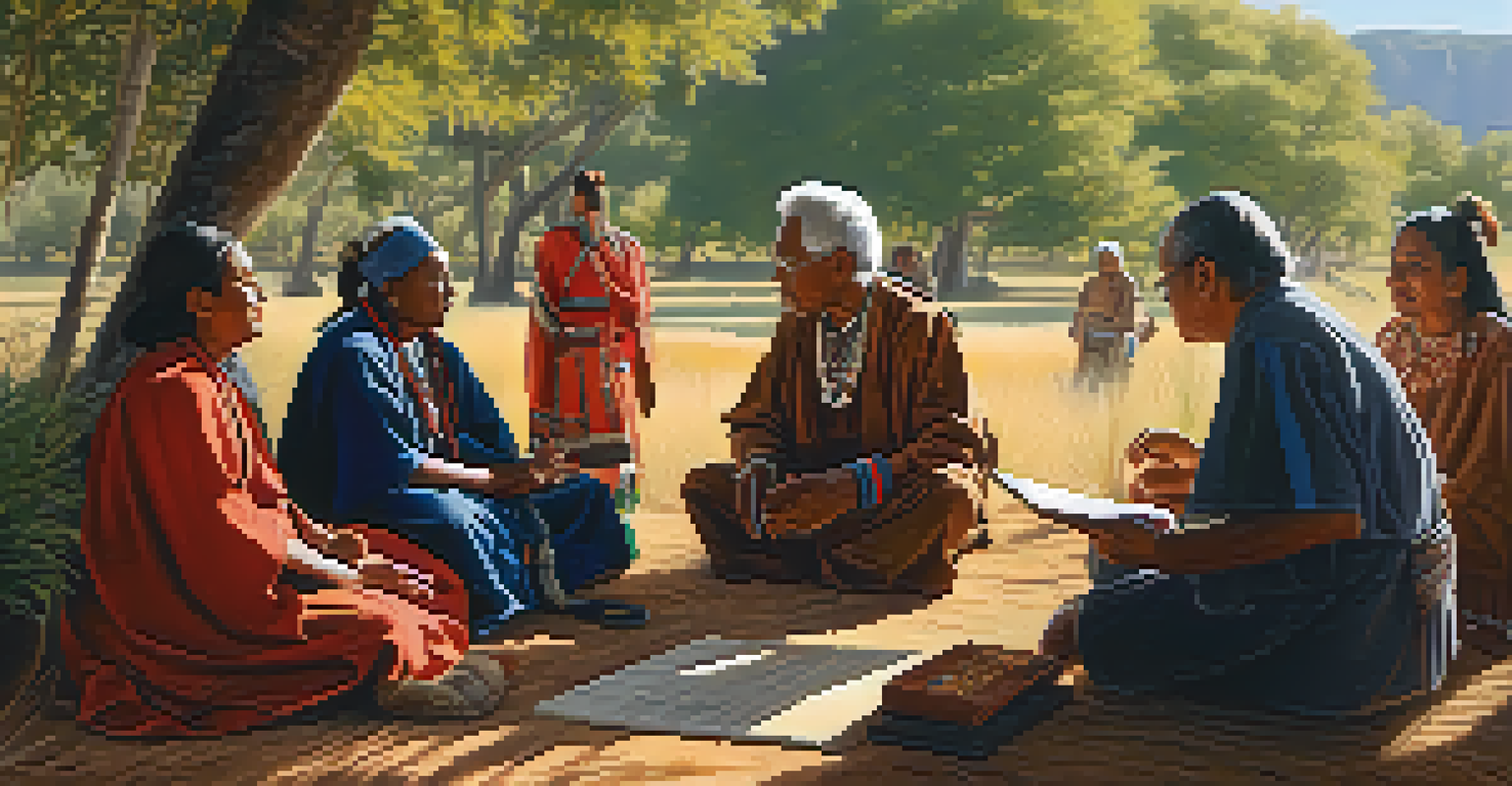Cultural Exchange: Entheogens in a Globalized World

Understanding Entheogens: Nature's Spiritual Tools
Entheogens are substances, often derived from plants, that are used in religious or spiritual contexts. They have been a part of human culture for thousands of years, with ancient civilizations utilizing them to connect with the divine. Think of them as nature’s way of opening the door to altered states of consciousness, offering insights and experiences that transcend ordinary reality.
The greatest discovery of my generation is that a human being can alter his life by altering his attitude.
Today, many cultures are revisiting these substances, recognizing their potential not just for spiritual growth but also for therapeutic benefits. For instance, psychedelics like psilocybin mushrooms and ayahuasca are being researched for their ability to alleviate mental health issues, such as depression and PTSD. This resurgence has sparked renewed interest and dialogue around the use of entheogens in both traditional and modern contexts.
As our world becomes more interconnected, the conversation surrounding entheogens is evolving. This shift invites individuals from various backgrounds to explore the practices and beliefs of different cultures, promoting a deeper understanding of how these substances can facilitate personal and collective healing.
Cultural Exchange: A Two-Way Street
Cultural exchange isn’t just about one culture absorbing another; it's a dynamic interaction. When different cultures encounter one another, they exchange ideas, traditions, and practices, leading to hybrid forms of spirituality and healing. For instance, Western interest in traditional Amazonian practices has brought ayahuasca ceremonies into the spotlight, creating a blend of ancient rituals and modern mindfulness.

However, this exchange can sometimes lead to cultural appropriation, where elements of a culture are adopted without understanding their significance. It's essential to approach these practices with respect and integrity, recognizing the context from which they originate. Engaging with indigenous communities and honoring their traditions can lead to a more authentic and meaningful experience.
Entheogens and Mental Health Benefits
Entheogens are being researched for their potential therapeutic effects on mental health issues like depression and PTSD.
Ultimately, this two-way street allows for shared knowledge and growth. As people from diverse backgrounds come together to explore entheogens, they contribute to a broader understanding of consciousness, spirituality, and healing, enriching the global tapestry of human experience.
Entheogens and Mental Health: A Cultural Perspective
Recent studies have shown that entheogens can have profound effects on mental health, leading to a surge of interest in their therapeutic potential. For many, these substances offer a path to confront and heal deep-seated traumas in a safe, guided environment. This has opened the door to discussions about how ancient traditions can inform modern therapeutic practices.
Cultural exchange is not a one-way street; it is a dialogue that allows us to learn from one another.
Different cultures have long used entheogens in healing rituals, often involving community support and spiritual guidance. For example, in many Indigenous cultures, shamans facilitate the use of entheogens to help individuals confront their inner struggles. This holistic approach emphasizes the importance of community and connection in the healing process, a perspective often missing in Western medicine.
As the stigma around psychedelics diminishes, there's a growing recognition of the value of traditional practices. This acknowledgment paves the way for integrating these ancient methods into contemporary mental health treatment, creating a more inclusive and effective approach to healing.
Legalization: A Global Shift in Perspective
The conversation around the legalization of entheogens is gaining momentum worldwide. Countries like Canada and several U.S. states are beginning to recognize the potential benefits of these substances, both for individual healing and societal wellness. This shift marks a significant change, as societies reconsider their historical views on psychedelics.
Legalization not only opens up access to therapeutic use but also encourages responsible research and education. By removing the stigma associated with entheogens, we foster an environment where individuals can safely explore their potential. This is crucial for dismantling misconceptions and promoting informed discussions about their use.
Cultural Exchange Requires Respect
Engaging with entheogenic practices necessitates a respectful approach to avoid cultural appropriation and honor their origins.
As more regions embrace this change, we might witness a global movement towards a more inclusive and open-minded approach to entheogens. This transformation could lead to richer cultural exchanges, where knowledge and practices flow freely across borders, further enhancing our understanding of these powerful substances.
Respecting Indigenous Knowledge and Practices
Indigenous cultures have long been the guardians of entheogenic knowledge, often viewing these substances as sacred. It's vital to honor and respect these traditions, acknowledging the wisdom that comes from generations of practice. When engaging with entheogenic experiences, understanding their cultural significance can deepen our appreciation and enhance our personal journeys.
Collaborative efforts between researchers and Indigenous communities can foster a respectful exchange of knowledge. By creating partnerships, we can ensure that the voices of those who have historically used these substances are heard and valued. This collaboration can lead not only to more ethical research but also to preservation of traditional practices.
Ultimately, respecting Indigenous knowledge allows us to benefit from their insights while promoting cultural sensitivity. This approach helps to prevent the commodification of sacred traditions, ensuring that entheogens are treated with the reverence they deserve.
Challenges of Cultural Exchange in Entheogenic Practices
While cultural exchange can lead to enriching experiences, it also presents challenges. Misunderstandings and misappropriations can arise when practices are taken out of their cultural context. This can result in a diluted or distorted understanding of the substance's significance, undermining the very healing that many seek.
Furthermore, the commercialization of entheogens poses a risk, as businesses may prioritize profit over integrity. This shift can lead to the exploitation of traditional practices, stripping them of their cultural significance. It’s crucial for consumers to be informed and mindful of where they source their experiences to ensure they support ethical practices.
Legalization Sparks Global Dialogue
The growing movement towards the legalization of entheogens is reshaping societal perspectives and encouraging informed discussions.
Navigating these challenges requires a commitment to education and respect. Engaging with the roots of these practices allows for a more authentic experience, fostering a deeper connection to the cultural heritage behind them.
The Future of Entheogens in a Globalized World
As we look to the future, the role of entheogens in a globalized world seems promising yet complex. With increasing acceptance and research, these substances may become integral to both therapeutic practices and spiritual exploration. The challenge lies in ensuring that this growth is grounded in respect and understanding of their cultural origins.
Global dialogues surrounding entheogens can lead to innovations in how we approach mental health and spirituality. By integrating diverse cultural perspectives, we can create more holistic and inclusive frameworks that respect traditional practices while embracing modern advancements. This synergy can enhance our collective understanding of consciousness.

In this evolving landscape, fostering respectful relationships between cultures will be essential. By honoring the rich tapestry of knowledge surrounding entheogens, we can navigate the complexities of cultural exchange and contribute to a world that values diversity and interconnectedness.